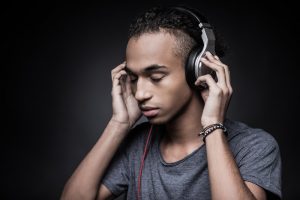Listening to loud music is a great pleasure, but it can weaken the basilar membrane cells and cause irreparable damage.
Listening to music at full volume is one of the great pleasures of life, we will not deny it. However, it can have major consequences on the quality of your hearing . We tell you how this habit can affect your ears.
You are in the gym and suddenly you feel that you have almost no energy to continue with your routine. Or you are running outdoors and you feel that you still need more than you would like to finish your route … what if you better do it walking? Many times in these situations of exhaustion, a dose of loud music can fill us with energy and give us a kind of super power that gives us better results in exercise . (Also Read: These are Apple Music key strategies to compete with Spotify)
It can also happen that you had a very difficult day and you come home tired, so to relax and distract yourself a bit, you decide to listen to some of your favorite songs at full volume while you spend a few minutes on the couch. In any of these cases, music plays a huge role in the way we feel. Surely you have your favorite music applications and you know the exact moment to play that playlist that you created to accompany life situations. So far everything is going very well, but have you ever wondered what happens in your ears when you listen to the music at full volume ? Unfortunately, it is not as positive as we would like. (Also Read: These are Apple Music key strategies to compete with Spotify)
Effect of loud music on the ears

To begin with, it would be necessary to define how it is that we can hear sounds . When a sound happens, it produces a vibration that travels in space, both through solid objects and liquids. This vibration reaches the ear and generates a reaction in the eardrum that moves and this also moves the atrial chain, a series of bones that communicate with the auditory nerve and the brain, which eventually makes the sound take shape and we can distinguish if it is music, noise, voices, etc. and we also begin to interpret the stimulus and give it a meaning. But this comes a little later.
A little before this important moment as the reception and interpretation of sound is , there is a part of our body that is in charge of processing the stimulus called the basilar membrane and which is responsible for the frequency response of the human ear. Here, bass sounds are also distinguished from treble, and although it is not yet the part that sends the vibration of the sound to the brain to be interpreted, it is a fundamental part of the subject we are dealing with here. And it is that this basilar membrane is made up of cells that are extremely sensitive to elements that can damage them, such as loud sounds.(high volume) even for short periods of time or, on the other hand, to sounds that, although not high volume , last a long time. That is, a person can damage the cells of the basilar membrane both by listening to music at a very high volume for a short period of time and by being exposed to a sound that does not necessarily have a high volume , but it happens constantly . As would be the case of a person who works in a factory, for example. Both cases permanently damage cells .(Also Read: How Do I Change Google Translate Voice To Male?)

When this happens, we have a hard time hearing sounds clearly. A bit like when we feel like we have “plugged ears”. For this reason, sometimes it happens that we go to a music concert that is heard very loud (especially in genres such as techno or metal, which houses some of the most important songs of all time) and when we go out we hear strange and it costs us I work to distinguish sounds clearly. What happens in these cases is that the cells of the basilar membrane are overwhelmed and probably inflamed. When they deflate, we listen again normally. The classic case of coming home from a concert and hearing poorly, but waking up better the next day. (Also read: The sounds of nature make us feel better)
Although in this example the damage can be repaired, when the exposure to sound that damages the ear is very constant, then it can cause irreparable effects. For example, a ringing in the ears that makes it difficult to hear people speaking when there is a lot of noise around. It can also generate the creation of molecules called reactive oxygen species, which permanently damage the cells of the ear by stealing electrons (this is called oxidative stress, in case you want to know more about it). (Also Read: Here’s how to listen to music at the same time thanks to a new Apple product)
The solution
To avoid problems as complex as these, it is best to listen to music at a volume of 80% of the capacity of electronic devices or less than this, in addition to going to a doctor to check the quality of hearing from time to time. Another good tip is to use ear plugs ears when there is a strong or constant exposure to the sound .

